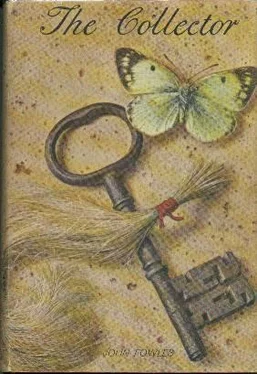It won’t happen again, I said.
“That’s what I wanted to say. If it does happen again—and worse. And you have to give way to it. I want you to promise something.”
It won’t happen again.
“Not to do it in a mean way. I mean don’t knock me unconscious or chloroform me again or anything. I shan’t struggle, I’ll let you do what you like.”
It won’t happen again, I said. I forgot myself. I can’t explain.
“The only thing is, if you ever do anything like that I shall never never respect you, I shall never, never speak to you again. You understand?”
I wouldn’t expect anything else, I said. I was red as a beetroot by then.
She held out her hand. I shook it. I don’t know how I got . out of the room. She had me all at sixes and sevens that evening.
Well, every day it was the same: I went down between eight and nine, I got her breakfast, emptied the buckets, sometimes we talked a bit, she gave me any shopping she wanted done (sometimes I stayed home but I went out most days on account of the fresh vegetables and milk she liked), most mornings I cleaned up the house after I got back from Lewes, then her lunch, then usually we sat and talked for a bit or she played the records I brought back or I sat and watched her draw; she got her own tea, I don’t know why, we sort of came to an agreement not to be together then. Then there was supper and after supper we often talked a bit more. Sometimes she made me welcome, she usually wanted her walk in the outer cellar. Sometimes she made me go away as soon as supper was over.
I took photos whenever she would let me. She took some of me. I got her in a lot of poses, all nice ones, of course. I wanted her to wear special clothes, but I didn’t like to ask. I don’t know why you want all these photos, she always said. You can see me every day.
So nothing happened really. There were just all those evenings we sat together and it doesn’t seem possible that it will never be again. It was like we were the only two people in the world. No one will ever understand how happy we were—just me, really, but there were times when I consider she didn’t mind in spite of what she said, if she thought about it. I could sit there all night watching her, just the shape of her head and the way the hair fell from it with a special curve, so graceful it was, like the shape of a swallowtail. It was like a veil or a cloud, it would lie like silk strands all untidy and loose but lovely over her shoulders. I wish I had words to describe it like a poet would or an artist. She had a way of throwing it back when it had fallen too much forward, it was just a simple natural movement. Sometimes I wanted to say to her, please do it again, please let your hair fall forward to toss it back. Only of course it would have been stupid. Everything she did was delicate like that. Just turning a page. Standing up or sitting down, drinking, smoking, anything. Even when she did things considered ugly, like yawning or stretching, she made it seem pretty. The truth was she couldn’t do ugly things. She was too beautiful.
She was always so clean, too. She never smelt anything but sweet and fresh, unlike some women I could mention. She hated dirt as much as I do, although she used to laugh at me about it. She told me once it was a sign of madness to want everything clean. If that is so, then we must both have been mad.
Of course it wasn’t all peace and light, several times she tried to escape, which just showed. Luckily I was always on the look-out.
One day she nearly had me. She was dead cunning, when I went in she was being sick, and she looked a real mess. I kept on saying what’s wrong, what’s wrong, but she just lay there like she was in pain.
“It’s appendicitis,” she got out in the end.
How do you know, I asked.
“I thought I’d die in the night,” she said. She spoke like she hardly could.
I said it could be other things.
But she just turned her face to the wall and said, Oh, God.
Well, when I got over the shock, I saw it might be just her game.
The next thing was she was all doubled up like in a spasm and then she sat up and looked at me and said she would promise anything but she must have a doctor. Or go to hospital, she said.
It’s the end for me, I said. You’d tell them.
“I promise, I promise,” she said. Really convincing. She could certainly act.
I’ll make you a cup of tea, I said. I wanted time to think. But she doubled up again.
There was all the sick on the floor. I remembered Aunt Annie said with appendicitis it could kill, only a year back the boy next door got it, and she said then they waited too long—Aunt Annie knew all the time, and it was a wonder he never died. So I had to do something.
I said, there’s a house with a telephone down the lane. I’ll run down.
“Take me to hospital,” she said. “It’s safer for you.”
What’s it matter, I said, like I was really in despair. It’s the end. It’s goodbye, I said. Until the police court. I could act too.
Then I rushed out like I was very upset. I left the door open, and the outer door, and I just waited there.
And out she came, in a minute. No more ill than I was. No trouble, she just gave me one look and went on back down. I looked nasty just to give her a scare.
She had moods that changed so quick that I often got left behind. She liked to get me stumbling after her (as she said one day—poor Caliban, always stumbling after Miranda, she said), sometimes she would call me Caliban, sometimes Ferdinand. Sometimes she would be nasty and cutting. She would sneer at me and mimic me and make me desperate and ask me questions I couldn’t answer. Then other times she would be really sympathetic, I felt she understood me like no one since Uncle Dick, and I could put up with everything.
I remember a lot of little things.
One day, she was sitting showing me the secrets of some paintings—secrets were the things you had to think about to see, the secrets of proportion and harmony she called them. We sat with the book between us and she talked about the pictures. We sat on the bed (she made me get cushions and a rug on it for the day), close but not touching. I made sure of that after the events in the garden. But one evening she said, don’t be so stiff, I shan’t kill you if your sleeve touches mine.
All right, I said, but I didn’t move.
Then she moved, so our arms touched, our shoulders. All the time she went on talking and talking about the picture we were looking at, I thought she wasn’t thinking about the touching but a few pages later she suddenly looked at me.
“You’re not listening.”
Yes, I am, I said.
“No, you’re not. You’re thinking about touching me. You’re all stiff. Relax.”
It was no good, she’d got me all tense. She stood up. She was wearing a narrow blue skirt I bought her and a big black jumper and a white blouse, the colours really suited her. She stood in front of me and after a bit she said, Oh, God.
Then she went and beat her fist against the wall. She used to do that sometimes.
“I’ve got a friend who kisses me every time he sees me and he doesn’t mean anything—his kisses are meaningless. He kisses everybody. He’s the other side of you. You don’t have any contact with anybody and he has it with everybody. You’re both equally sick.”
I was smiling, I used to smile when she attacked me as a sort of defence.
“Don’t put on that ghastly smile.”
There’s not much else I can do. You’re always right.
“But I don’t want always to be right. Tell me I’m wrong!”
Oh, you’re right, I said. You know you’re right.
“Oh, Ferdinand!” she said. And then twice more, Ferdinand, Ferdinand, and she sort of prayed to heaven and acted someone in great pain, so I had to laugh, but suddenly she was all serious, or pretending it.
Читать дальше












